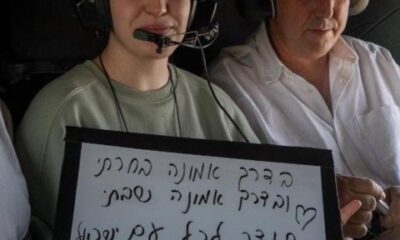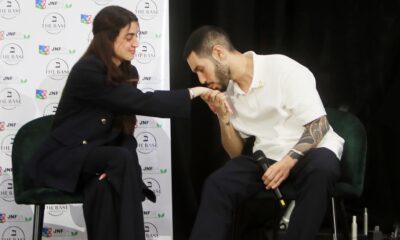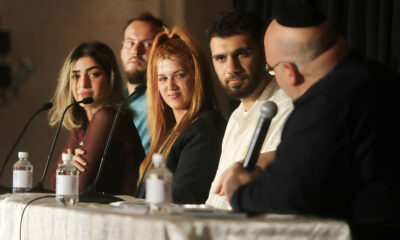
Lifestyle

Documentary takes new look at oldest hatred
Filmmaker Wayne Kopping created the documentary Tragic Awakening – A New Look at the Oldest Hatred which tackles antisemitism since 7 October. The SA Jewish Report speaks to him about this project.
What inspired you to tackle this project?
After 7 October, everyone felt a deep need to do something. Rabbi Shalom Schwartz approached me with the opportunity to make a film about antisemitism, and when I learned it would be based on Who’s Afraid of the Big Bad Jew by Rabbi Raphael Shore, I knew it was something I had to do. Shore, a longtime collaborator and producer of this film, has explored these ideas for years and his work formed the foundation of our message.
It was a chance to give something meaningful to the Jewish people at a time of immense pain.
What’s the core message?
Antisemitism isn’t about the antisemites, it’s about us. Tragic Awakening is based on Who’s Afraid of the Big Bad Jew, in which Rabbi Shore explores why antisemitism exists and what it means for the Jewish people today. The film dismantles common explanations: scapegoating; jealousy; conspiracy theories, and focuses on the real issue: the Jewish people have a unique purpose, and that demands a response.
Why is this message urgent?
Jewish history repeats itself because we either misinterpret what we’re going through or make the same mistakes again and again. This film is about breaking that cycle. It challenges misconceptions about Jewish history, who we are, and our role in the world. Understanding what’s really happening is the first step to change.
How did you make this documentary?
I wasn’t just the director of this film, I was the editor. That meant sifting through hundreds, if not thousands, of hours of material. Early on, I realised that antisemitism is such a deeply personal and controversial topic that the way we framed it would be just as important as the message itself. I had more than one audience in mind.
On the one hand, this film had to speak to the greater non-Jewish world. But just as critically, it had to resonate with the Jewish world. It meant telling the story in a way that any Jewish person, regardless of background, country, or level of observance, could connect to.
Why structure the film around two rabbis and a Muslim woman?
We had to tell the story in a way that wouldn’t overwhelm or alienate the audience. At the same time, the film needed to resonate with Jews across all backgrounds and levels of observance while providing non-Jews with an accessible framework for understanding antisemitism.
Rawan Osman, a Syrian-Lebanese Arab, became the perfect lens through which to explore these questions. She wasn’t just a guide, she was the audience’s proxy. Her journey allowed viewers to engage with the subject in a way that felt personal, organic, and deeply human.
To complement this, I persuaded the rabbis to appear in the film because I felt they could provide the most authentic Jewish and historical perspective. Their years of experience and research in this area brought depth and clarity.
Why is it important for you to tell Jewish stories?
Growing up, my Jewish identity was peripheral. In my 20s, I made a decision to learn about my heritage and what it means to be a Jew, and it’s a journey that has deepened over the past 30 years.
Today, the Jewish story isn’t just central to who I am, it’s central to what is happening in the world.
Who is the intended audience for Tragic Awakening?
From the start, I had two audiences in mind. One was the greater non-Jewish world, and the other the Jewish world. For the non-Jewish audience, the goal was to provide clarity, to explain antisemitism in a way that goes beyond the usual surface-level narratives. For the Jewish audience, I needed to tell this story in a way that any Jewish person, regardless of background, country, or level of observance, could connect with. From the overwhelming feedback we’ve received, it’s clear the film has resonated across the spectrum.
Why do you believe antisemitism is on the rise?
We’re at a stage of history where everything is rising – tension, polarisation, intensity. This is a time when every human being is being forced to confront fundamental questions: What’s right? What’s wrong? What’s good? What’s evil?
Historically, when societies reach moments of upheaval, the Jewish people become the focal point. What we’re seeing today isn’t new, it’s history repeating itself, but in a world that’s more connected, reactive, and volatile than ever before.
How do you believe we should deal with it?
For decades, perhaps even more than a century, people have approached the Israel-Arab conflict as if it were a political or territorial dispute. And then they’re left bewildered when there’s no political or territorial solution. But what if this isn’t a political or territorial war at all? What if this is a spiritual war, which, incidentally, is exactly what the Islamic world has called it – a “jihad” (religious war)?
And if it’s a spiritual war, then surely what is needed is a spiritual response.
Do you believe antisemitism will subside once this war in Israel is over?
This war isn’t about radical Islam, Hamas, the United Nations, or Neo-Nazis. Our enemies have changed names a hundred times – Egyptians, Greeks, Romans, Nazis, Hamas. But the one constant? We’re still here. History shows that when Jews embrace their identity, their enemies fade.
How do you believe we should respond to the way Israel is portrayed in the media?
We all know that “Jews is news” and that there’s a disproportionate, and dare I say, demented, obsession with us. But honestly, we waste way too much time and energy following the news and screaming at our phones. At the end of the day, it doesn’t matter what is said about us, it’s all just noise. Worse, it’s a distraction.
What truly matters is what we do. That we spend our time on things that are meaningful and connecting.
I work in media. I’m in the business of trying to change minds and shape perceptions. And I can confidently say that it’s not the noise that moves the needle. Ultimately what really counts is what we do and how we live our lives.
What has been the response to Tragic Awakening?
This film is touching something deep in the hearts and souls of those who watch it. It’s been incredibly gratifying to see how Tragic Awakening speaks to Jews and non-Jews alike across all backgrounds and levels of observance.
Where can we see it now?
The only way to see Tragic Awakening is by attending or organising a screening, or by joining one of our online screening and discussion forums.
We’re encouraging people to reach out to us to set up screenings in their shuls, communities, businesses, schools, and beyond. We’re also ramping up our online screenings, at which we not only show the film but take the time to engage in meaningful discussion about its deeper themes.
For more information or to set up a screening, contact us at TAscreenings@gmail.com or visit TragicAwakening.com










